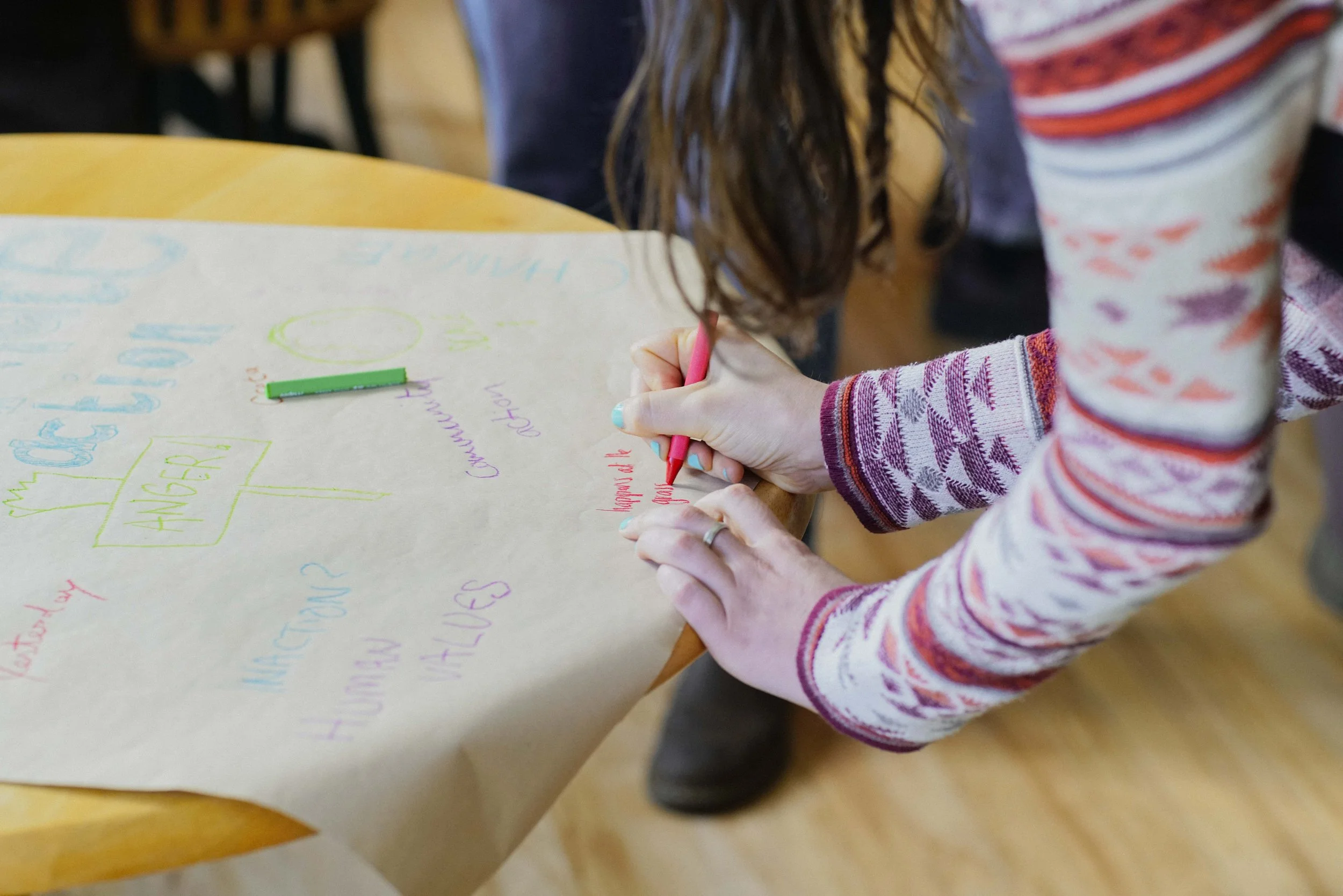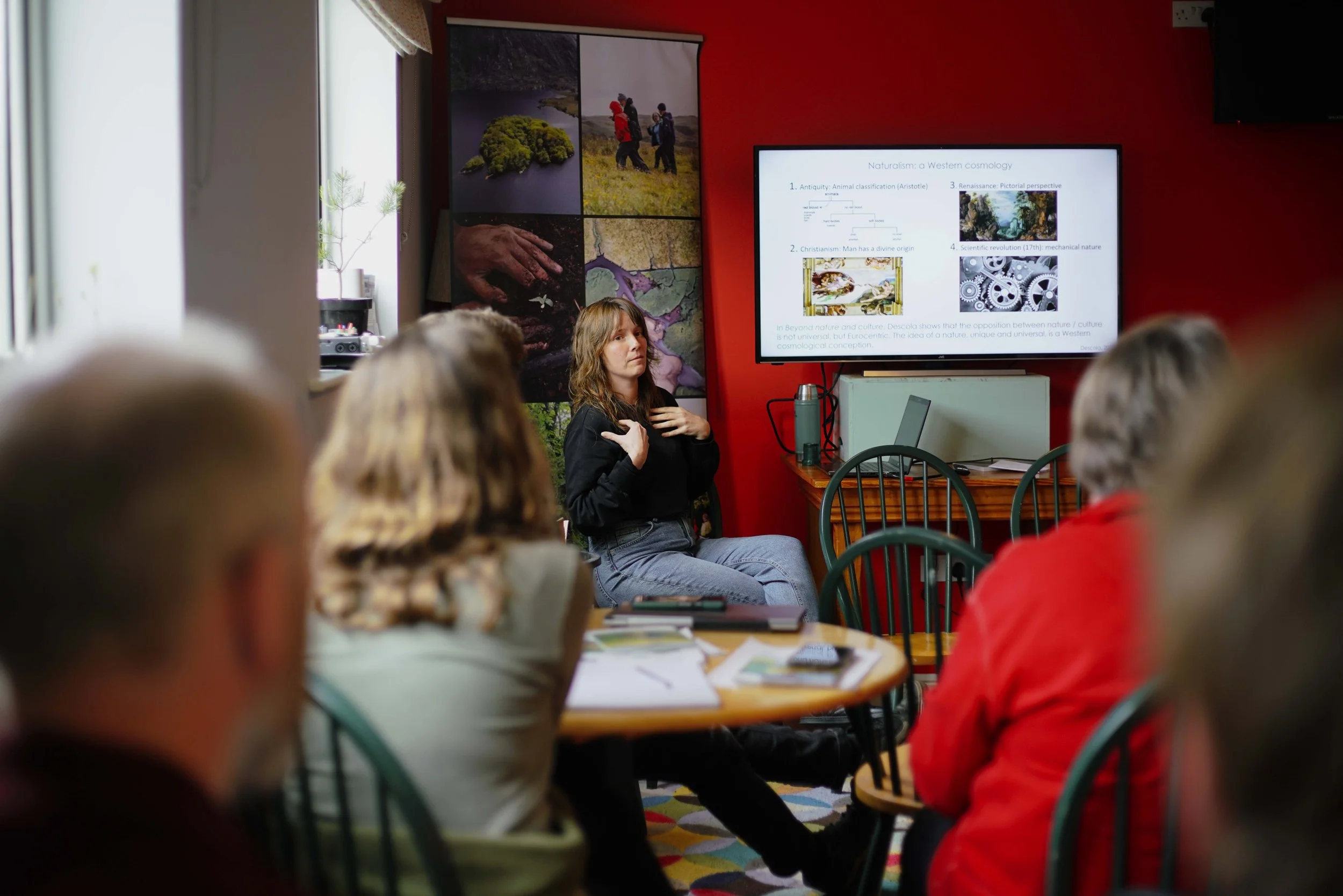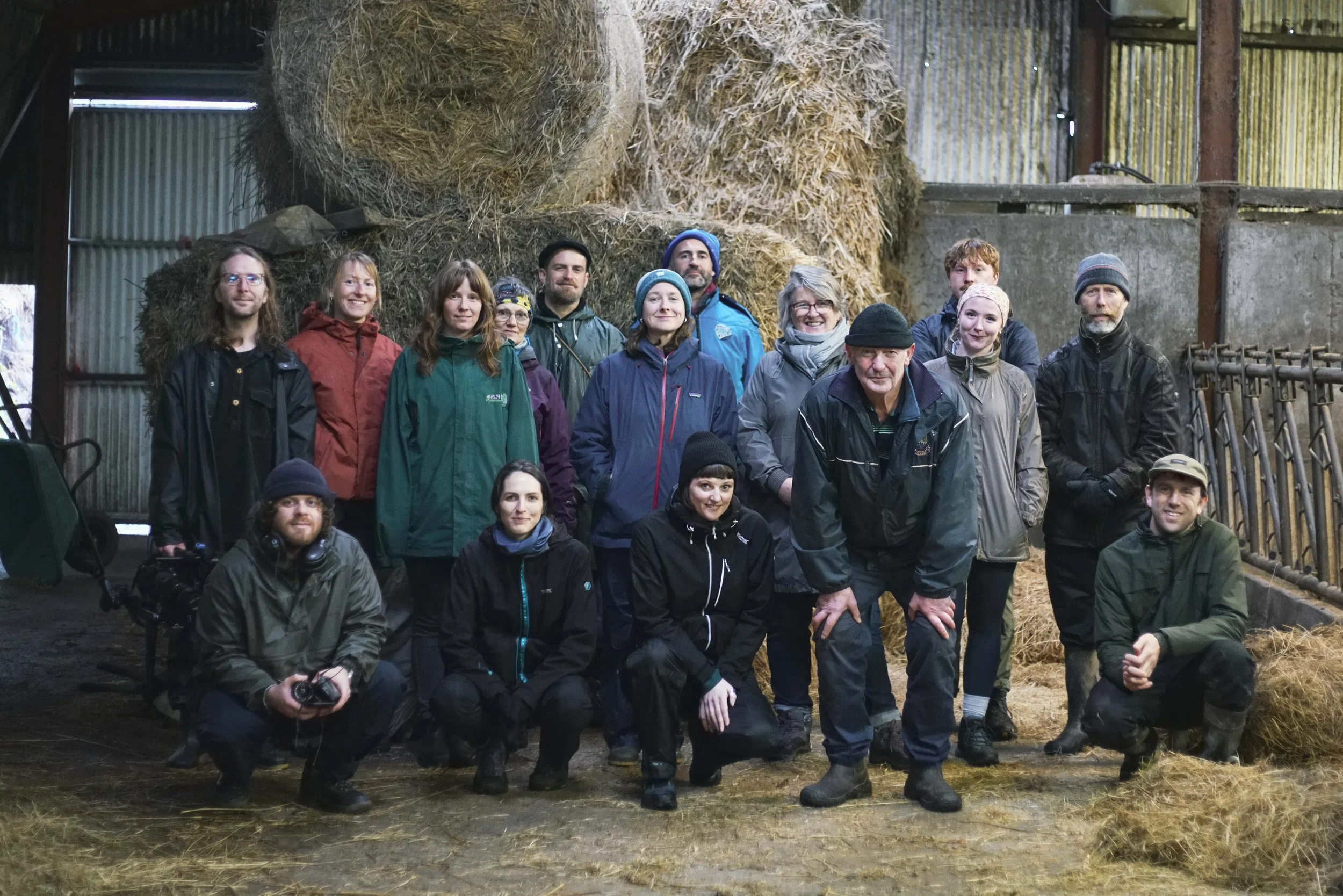Dinnseanchas Immersive Residency
The group of Dinnseanchas artists, mentors, workshop leaders and stakeholders at Dromalonhurt Bog in Co. Kerry.
The Dinnseanchas project is tasking a group of artists to engage with the difficult themes of biodiversity loss, agricultural policy and practice, and to support an envisioning process that includes the voices of upland communities.This is no small challenge, and we're delighted to have such a capable and talented group of artists working on the project.
To equip them with some of the knowledge that they might need to approach these themes, and also as a way of getting to know each other and kick off the project, the full project team met in Glencar, Co. Kerry for an immersive residential week. The Climber's Inn was the ideal location - warm, welcoming, and situated among some of Ireland's highest mountains. Any fear that the group wouldn't gel together dissipated within minutes as a hum of conversation began and didn't end until we all left, invigorated, on Friday.
The group of artists were joined by project mentor Jennifer Ahern, writer-in-residence Grace Wells, project consultant David Teevan, and various local stakeholders and community members (special mention to Mary McGillicuddy of Quiet Adventures who attended almost every event). Project leads Ray Ó Foghlú and Lucy Taylor were supported by Hometree intern Hannah Griffey.
Project participants at the workshop sharing their assumptions and ideas about concepts such as ‘climate action’ and ‘biodiversity’.
First, we needed the vocabulary and rudimentary knowledge to understand the landscapes of the uplands. We were guided in this by ecologist Jack O’Donovan Trá, who introduced us to habitats such as ‘wet heath’ and ‘blanket bog’ and to some of the charismatic upland animals including the highly endangered breeding curlew.
Having looked at the natural world, the first morning started with an introduction to the social and economic context of Ireland’s uplands. Social geographer Breandán Ó Caoimh presented the stark reality of the poverty of many upland communities as well as their aging profiles and the lack of full-time employment. He discussed the importance of agriculture, and of the issues faced by Gaeltacht regions. Catriona Foley of Teagasc then shared her experience of working with farmers in the Comeragh Mountains and their innovation project that looked at training farmers in habitat management, and also celebrated the rich natural and cultural heritage of the Comeragh mountains. Caitlín Breathnach met us to share her reflections on the Tascfhórsa Uíbh Ráthaigh, which works to retain and attract families and support services to the Gaeltacht areas of south Kerry. These stories of bottom-up and community-led solutions provided much needed hope and inspiration alongside the presentations of complex farming policies and challenging issues such as the climate change predictions that we were shown by Dervla McAuley of the EPA and the policies that were presented to us by Teagasc Forest Specialist Tom Houlihan and ACRES Project Manager for Kerry and west Cork, Patricia Deane.
After an enlightening conversation with a National Parks and Wildlife Service Conservation Officer, it was clear that they face similar challenges to farmers in terms of being at the mercy of policy changes, budgetary changes, and the uncertainty created by changing governments and ministers.
A workshop on systems change delivered by Jennifer Ahern.
We were warmly welcomed by Mike O’Shea for a tour of his farm, or at least the small bit of it that we could see in the heavy mist. Mike is one of the host farmers in the Kerry Social Farming programme, which he describes as a ‘win-win’. The programme matches adults with additional needs to farmers who will host a participant for a day or two a week. The programme is entirely voluntary so the benefits are purely social - the participants are integrated into the community and exposed to experiences that they wouldn’t have in day centres while the host farmers receive training, supports and become part of a county-wide network.
We also heard from a farmer who had participated in the reintroduction programme for the white-tailed eagle in Kerry. He described the difficulties of changing the minds of local people, bringing them into the project, and gaining support of sceptical communities. These principles were also detailed in a presentation by anthropology doctoral student Jennifer Ahern and in a subsequent workshop with arts consultant David Teevan.
The Dinnseanchas group at Mike O’Shea’s farm, Canuig, Co. Kerry.
Tom Houlihan of Teagasc speaking to the group in a native woodland near Bealach Oisín, Co. Kerry
As well as examining these current themes, we followed the theme of Dinnseanchas in exploring the rich heritage and history of Ireland’s uplands to see what we could learn as we start to look towards the future. Wetland ecologist Patrick Crushell took us on a very literal journey back in time as he pulled up core samples from over 2 metres deep in Dromalonhurt blanket bog. As the group bounced on the bog’s sodden surface and learned about sphagnum moss, carnivorous plants, and the carbon sequestering services of healthy bogs, it was mind-blowing to see and touch the turf that had been laid down thousands of years ago. Eugene Costello, an environmental historian then brought us forward in time to the 17th and 18th centuries and the traditions of ‘booleying’, of grazing cows in uplands and woodlands, and through the changing farming practices and landscapes of previous centuries.
The week was mentally challenging, but also exhilarating in terms of the number of ideas, conversations and connections that were formed. It’s clear that our current situation isn’t working for the uplands - healthy habitats, livelihoods, communities and heritage are all being eroded rapidly. There is certainly wisdom in looking to the past and to the land itself for guidance as we move forward, but it’s also clear that we are going to have to navigate unprecedented situations that will require new stories, new language, and new ways of understanding and working with each other.
While Hometree has its own vision, it’s also clear that there are numerous voices and visions for Ireland’s uplands. The task now for our group of artists is to listen to these voices and weave some of them together as they creatively respond to the many nuances and needs of these fragile and vital places.
Photo credits: Myriam Riand (@myriamdelirium)
Dinnseanchas is a recipient of the Creative Climate Action fund, an initiative from the Creative Ireland Programme. It is funded by the Department of Tourism, Culture, Arts, Gaeltacht, Sport and Media in collaboration with the Department of the Environment, Climate and Communications. The fund supports creative, cultural and artistic projects that build awareness around climate change and empower citizens to make meaningful behavioural transformations. For more on Creative Climate Actions, see here.






